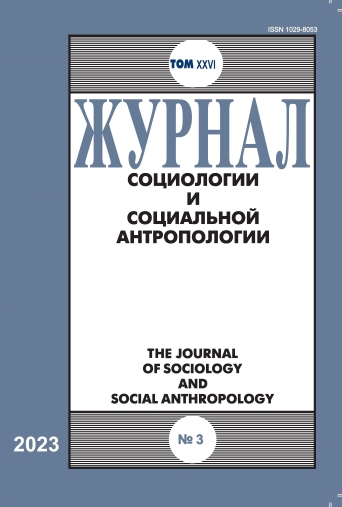The Frustration of a Subject in Narratives of “Covid Diaries”
Abstract
During the pandemic of COVID-19 governments of most countries around the world imposed significant limitations for the freedom of movement and social contacts, which became a source of psycho-emotional issues for some social groups even when there were no noticeable financial consequences of the quarantine. Based on the covid diaries by Russian-speaking scholars in humanities, the article proposes an explanation for the negative reaction of authors to the situation of pandemic from the point of view of neoliberal subjectivity characteristics outlined by Dardot and Laval, within the framework of state of emergency theory by Giorgio Agamben. The research was not focused on socio-economic changes caused by the global quarantine, but on deconstructing the norms and subjectivity features exposed in narratives of covid diaries in response to repressive calls of the pandemic. The discourse analysis method by Potter and Wetherell allows to reveal diaries authors’ attitude regarding the situation and allow to separate it from alternative competing models of reality, while justifying authors’ reaction to what’s going on. There are four interpretative repertoires that are extracted from the discourse analysis of diaries: a repertoire of using space, of managing time, of socialization priorities and of self-care. The analysis shows that the main sources of psycho-emotional issues for the considered social profile were frustration caused by impossibility to implement neoliberal imperatives of high productivity and consumer variety, anxiety caused by the bio-political repressions of the governments and fear of coronavirus.
References
Агамбен Д. (2014) Нагота. М.: Грюндриссе.
Бахтин М. (2017) Слово в романе. СПб.: Пальмира.
Карпова Э, Николаева Н. (2020) Негативные психоэмоциональные последствия пандемии COVID-19 в группе риска. Национальный психологический журнал, 3(39): 66–74.
Разинов Ю. (2021) Маргинальное время труда и досуга: экзистенциально-онтологический аспект. Труд и досуг. Альманах центра исследований экономической культуры. М.: Издательство Института Гайдара.
Семенова Н. (2022) К вопросу о психологических последствиях пандемии Ковид-19: обзор. Психотерапия, 1–2: 19–24.
Agamben G. (2021) Where are we now? Epidemic and Politics. L.: Eris Press.
Alaszewski A. (2006) Using diaries for social research. L.: Sage.
Bolger N., Davis A., Rafaeli E. (2003) Diary methods: Capturing life as it is lived. Annual Review of Psychology, 54: 579–616.
Collins R. (2020) Social distancing as a critical test of the micro-sociology of solidarity. American journal of cultural sociology, 8(3): 477–497.
Dardot P., Laval C. (2014) The New Way of the World: On Neo-Liberal Society. L.: Verso.
Foucault M. (1995) Discipline and Punish. N.Y.: Vintage Books.
Klein N. (2008) The Shock Doctrine. The Rise of Disaster Capitalism. L.: Picador.
Kontoangelos K., Economou M., Papageorgiou C. (2020) Mental health effects of COVID-19 pandemic: a review of clinical and psychological traits. Psychiatry investigation, 17(6): 491.
Litvina D., Temkina A. (2021) The Academicians on Quarantine: Reflexivity and Fragility of a Privileged Group at the Start of Pandemic. Russian Sociological Review, 20(4): 43–65.
Madianou M (2020) A Second-order disaster? Digital technologies during the COVID-19 pandemic. Social media + society, 6(3): 1–5.
Wetherell M., Potter J. (1988). Discourse analysis and the identification of interpretive repertoires. In: Antaki C. (ed.) Analysing everyday explanation: A casebook of methods. Newbury Park: Sage.
Schutz A. (1990) Symbol, Reality & Society. In: Schutz A. Collected Papers 1. The Problem of Social Reality. Kluwer Academic Publishers.
UN Policy Brief: COVID-19 and the need for action on mental health, 2020 URL: https://unsdg.un.org/sites/default/files/2020-05/UN-Policy-Brief-COVID-19-and-mental-health.pdf (дата обращения: 30 марта 2023).
Weidman A. (2014) Anthropology and Voice. Annual Review of Anthropology, 43: 37–51.

